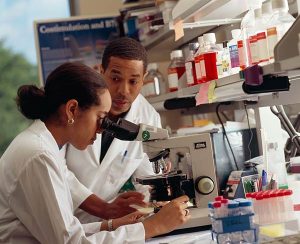 Many patients and families facing a neuroendocrine tumor (NET) diagnosis wonder if they inherited the disease from their parents or if they can pass it down to their children.
Many patients and families facing a neuroendocrine tumor (NET) diagnosis wonder if they inherited the disease from their parents or if they can pass it down to their children.
Most cases of NETs are not associated with hereditary risk factors. Researchers estimate that inherited factors may be associated in 17% of PNETs1 and 25% of pheochromocytomas and paragangliomas2. Other rates vary by primary site and subtypes of tumors.
Knowing you have an inherited genetic risk factor won’t always have an impact on your treatment plan, but it can affect a surveillance plan. If a genetic risk factor is confirmed, your doctor may order additional testing on a regular basis to monitor for other associated risks.
Inherited Risk Factors for NETs
| Name | Associated Syndrome(s) or Conditions | Affected Gene(s) | Related NETs |
|---|---|---|---|
| MEN1: Multiple endocrine neoplasia type 128,29 |
| MEN1 |
|
| MEN2: Multiple endocrine neoplasia type 21 |
| RET |
|
| MEN4: Multiple endocrine neoplasia type 41 |
| CDKN1B | NETS (pancreatic, lung, gastric)31 |
| VHL32 |
| VHL |
|
| CGA: glucagon cell adenomatosis33 |
| SDHD, SDHAF2, SDHC, SDHB |
|
| TSC: Tuberous sclerosis complex4 |
| TSC1, TSC2 |
|
| NF1: Neurofibromatosis type 11 |
|
|
Justin Annes, MD, PhD, Stanford University, is a physician-scientist with a long-standing interest in hereditary neuroendocrine tumors. He gave a talk on the subject at a NETRF patient and caregiver conference. View his presentation now:
How do you know if you have an inherited mutation?
The route to a clinical diagnosis for an inherited genetic mutation varies. In some cases, the presence of two or more associated medical conditions or syndromes can meet the criteria. A patient’s medical history, as well as their family’s medical history, is part of the evaluation process. Having a first-degree relative with a known mutation also plays an important role in establishing a clinical diagnosis.
If a genetic mutation is suspected or known, your doctor may conduct a clinical evaluation that could include:
- Blood or urine tests
- Imaging test
- Gene tests
There are many different types of gene tests using a range of technology. The types of gene testing kits advertised on TV or sold in the drug store will probably not help someone learn about their risk factors for NETs. The type of genetic test your doctor would order would screen for a specific set of mutations, which may not be included on the panels of the tests available commercially.
If you are thinking about genetic testing
If you are thinking about genetic testing for yourself or a family member, speak with a professional who is trained in genetics. These professionals can include doctors, genetic counselors, and other health care providers (such as nurses, psychologists, or social workers). Genetic counseling can help people consider the risks, benefits, and limitations of genetic testing. Sometimes the genetic professional finds that testing is not needed.
Genetic counseling includes a detailed review of the individual’s personal and family medical history related to possible cancer risk. Counseling also includes discussions about such issues as:
- Whether genetic testing is appropriate
- Which specific test(s) might be used
- The technical accuracy of the test(s)
- The usefulness of the test in making health care decisions.
- The psychological risks and benefits of learning one’s genetic test results
Genetic tests may not be covered by all insurance plans. Or tests may only be covered under strict criteria. It’s important to contact your health insurance plan to learn more about your coverage and to ask about the costs for genetic testing in advance of making any decisions.
Look for a genetic counselor https://www.nsgc.org/page/find-a-genetic-counselor
1Dasari A, Shen C, Halperin D, et al. Trends in the incidence, prevalence, and survival outcomes in patients with neuroendocrine tumors in the United States. JAMA Oncol. 2017;3(10):1335-1342.
2Singh S, Granberg D, Wolin E, et al. Patient-reported burden of a neuroendocrine tumor (NET) diagnosis: results from the first global survey of patients with NETs. J Glob Oncol. 2016;2(1):43-53.
3Sackstein PE, O’Neil DS, Neugut AI, et al. Epidemiologic trends in neuroendocrine tumors: an examination of incidence rates and survival of specific patient subgroups over the past 20 years. Seminars in Oncol. 2018;4(13):249-258.
4National Institute of Diabetes and Digestive and Kidney Diseases. Your digestive system and how it works. https://www.niddk.nih.gov/health-information/digestive-diseases/digestive-system-how-it-works. Accessed October 19, 2018.
26FSchernthaner-Reiter MH, Trivellin G, Stratakis CA. (2016). MEN1, MEN4, and Carney complex: pathology and molecular genetics. Neuroendocrinology, 103: 18e31.
27National Cancer Institute. Pheochromocytoma and Paraganglioma Treatment (PDQ®)–Health Professional Version. https://www.cancer.gov/types/pheochromocytoma/hp/pheochromocytoma-treatment-pdq Accessed October 9, 2018.
28National Cancer Institute. Genetics of Endocrine and Neuroendocrine Neoplasia (PDQ®)–Health Professional Version. https://www.cancer.gov/types/thyroid/hp/medullary-thyroid-genetics-pdq#link/_767 Accessed October 9, 2018.
29Cancer.NET, (ASCO® Patient Information). Multiple Endocrine Neoplasia Type 1. https://www.cancer.net/cancer-types/multiple-endocrine-neoplasia-type-1 Accessed October 10,2018.
30National Institute of Diabetes and Digestive and Kidney Diseases. Zollinger-Ellison syndrome. https://www.niddk.nih.gov/health-information/digestive-diseases/zollinger-ellison-syndrome Accessed October 10, 2018.
31Alrezk R, Hanah-Shmouni F, Stratakis CA. MEN4 and CDKN1B mutations: The latest in MEN syndromes. Edocr Relat Cancer 2017. 24;(10):T196-208
32National Cancer Institute. Pheochromocytoma and Paraganglioma Treatment (PDQ®)–Health Professional Version. https://www.cancer.gov/types/pheochromocytoma/hp/pheochromocytoma-treatment-pdq Accessed October 9, 2018.
33Mete, O., Chetty, R. (2017). Pancreatic endocrine neoplasia: familial syndromes. Diagn Histopathol, 23:8, 378.
34Cives, M., Strosberg, J.R. (2018). Gastroenteropancreatic Neuroendocrine Tumors. CA Cancer J Clinical, 1-17.
